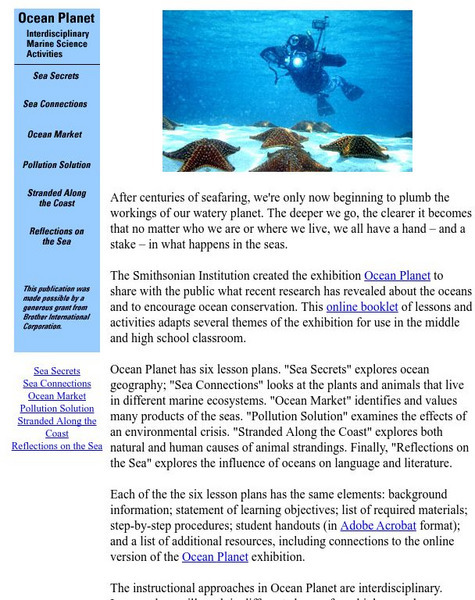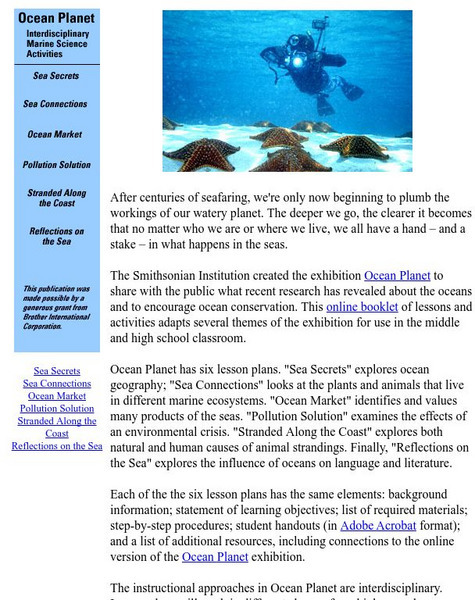Curated OER
Landforms By Hand: Geography, Map Skills
Learners experiment with landform vocabulary by using their own hands and a bar of soap as media.
Curated OER
Cutt-Off Genes
High schoolers explore how gene sequence analysis can be used to examine phylogenetic similarities of different organisms. Students work in groups to simulate a gel electrophoresis separation of fragments using poster board to create...
Curated OER
Oil Slick Emergency
Students examine how to recover and remove oil from an oil spill. In this oil spill clean-up lesson students use role play and act like a committee to determine how to clean up an oil spill.
Smithsonian Institution
Smithsonian Learning Lab: Contrasts in Blue: Life on the Caribbean Coral Reef and the Rocky Coast of Maine
Smithsonian Education presents Contrasts in Blue: Life on the Caribbean Coral Reef and the Rocky Coast of Maine. Teachers can download this comprehensive teaching package in which learners explore two marine ecosystems, the coral reefs...
National Geographic
National Geographic: Human Impacts on Marine Species
Students learn about three examples of human impacts on marine life: migration patterns and shipping, algal blooms and water chemistry, and marine debris. Some of these impacts are due to human activity in the ocean, and some impacts on...
National Geographic
National Geographic: Human Impacts on the World Ocean
For this lesson, learners are introduced to the idea that humans have enormous impacts on marine ecosystems and resources, and explore the stakeholders involved.
Alabama Learning Exchange
Alex: Diverse Life Forms of the Ocean
This lesson allows students to view and draw conclusions on the importance of life in the ocean. It uses student created movies to explore what is going on, as well as identifying the zones and diverse life associated with the oceans....
National Geographic
National Geographic: Ecosystem Imbalance in the World
In this lesson, students build on their knowledge of individual impacts on the ocean to see how the whole system can react to threats and changes. They examine ways in which human actions throw marine ecosystems out of balance, explore...
Smithsonian Institution
Smithsonian Education: Ocean Planet
A series of lesson plans designed to be used with the Smithsonian Ocean Planet exhibit (available online). Lesson topics include marine ecosystems, pollution of ocean water, animal strandings, and literature.
Nature Conservancy
The Nature Conservancy: Coral Reefs of Palau: Nature's Amazing Underwater Cities
This lesson plan takes students on a virtual field trip to the coral reefs of Palau where they will explore amazing underwater cities found near a remote network of islands in the Pacific Ocean. Learn all about an ecosystem of symbiosis....
Smithsonian Institution
Smithsonian: Ocean Planet: Interdisciplinary Marine Science Activities
Smithsonian Institution presents ?Ocean Planet: Interdisciplinary Marine Science Activities?. Through this series of six interdisciplinary lessons, students will look at such things as the organisms in different marine ecosystems, the...
Other
Ocean Tracks: Fact or Artifact? Interpreting Patterns in Ocean Tracks Data [Pdf]
Ever wonder where marine animals go? How fast they swim? How deep they dive? Electronic tagging has opened a new window into the world of the open ocean. Ocean Tracks gives you access to data collected by tags on real live migrating...
National Geographic
National Geographic: The World Ocean
A collection of four lessons where learners look at the vital role oceans play in our lives, at the hydrosphere and the impact humans have on it, how humans use the oceans and who is responsible for protecting them, and the rationale...
Scholastic
Scholastic Explorers: Ocean Life
This lesson plan explores how human activity has an impact on turtles, sea otters, and dolphins in different parts of the world. Your students will read field reports from the sites and evaluate data that is offered.
US National Archives
Docsteach: The Titanic Disaster: Measuring Loss of Life, Property and Injuries
Students will analyze claims filed by survivors, families of victims and owners of cargo of the Titanic disaster. They will examine claims for loss of life, loss of property and injuries that were filed as part of 'In the Matter of the...
PBS
Pbs Teachers: Ocean Activity Ideas
Explore ocean habitats, learn about the extreme weather of the ocean and examine environmental threats to the ocean. Conduct experiments on buoyancy and osmosis, and research sailing and ocean-based industry.
PBS
Pbs Teachers: Ocean Careers Exploration
Investigate careers in oceanography and marine exploration. Create a report on the life, education and career of a member of the Ocean Adventures Expedition team and present it in a creative way.
Varsity Tutors
Varsity Tutors: Web English Teacher: Walt Whitman
Not only for teachers. Explore the world of this famous writer when you visit the collection of links on Whitman at the Web English Teacher website.
Science Education Resource Center at Carleton College
Serc: Earthlabs: Corals Unit Overview
Six lab investigations on corals expose students to some of the most current scientific research, data, and visualizations in a way that allows them to become active participants in both learning about and conserving coral reefs.

















